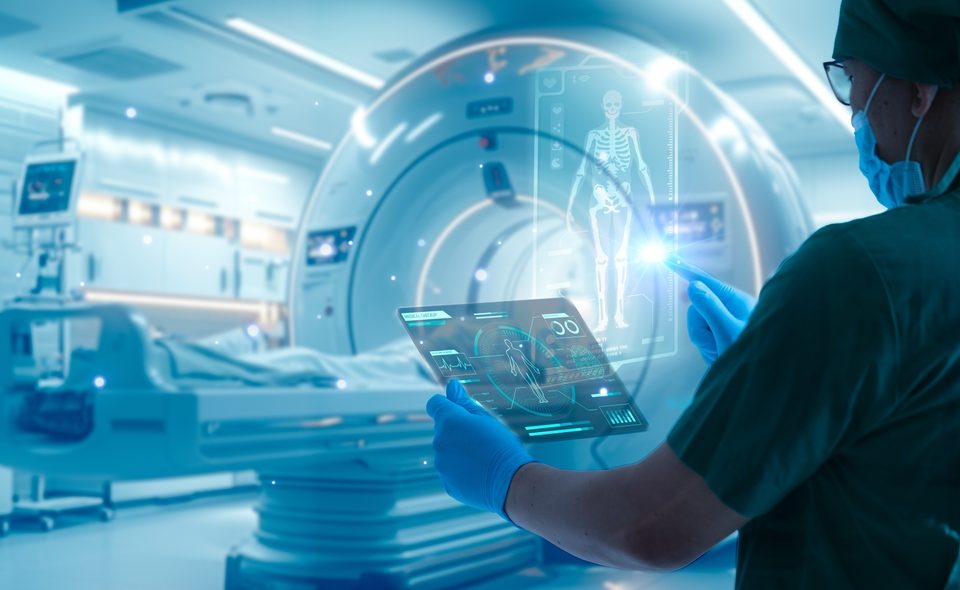The AI Prescription: How Gen AI is Transforming Healthcare
In the rapidly evolving world of healthcare, the convergence of technology and medicine is reshaping how we deliver care, improve patient outcomes, and manage data. Among the most groundbreaking developments is the rise of Generative AI (Gen AI), a subset of artificial intelligence that goes beyond traditional machine learning to create new content, generate insights, and revolutionise workflows. It’s clear that this transformation will profoundly impact every facet of healthcare, from diagnostics and treatment to operational efficiency and patient engagement.
The Power of Personalised Care
One of the most significant promises of Gen AI is the delivery of highly personalised care. By analyzing massive amounts of patient data—ranging from genetic information to lifestyle habits—Gen AI algorithms can generate customized treatment plans tailored to the individual. This approach not only improves the chances of successful outcomes but also minimises the risks of adverse reactions to treatments.
Imagine a patient with a rare genetic disorder. Traditionally, diagnosing such a condition might take months, but with Gen AI, advanced algorithms can process genomic data in hours, providing more accurate and timely diagnoses. According to Accenture, AI technologies in healthcare could save the U.S. healthcare system $150 billion annually by 2026, primarily by offering personalized care and improving operational efficiencies.
Accelerating Drug Discovery
Drug discovery is often a lengthy, costly process, taking years and billions of dollars to bring a new drug to market. Gen AI is poised to drastically shorten this timeline by identifying viable drug candidates faster. Through AI-generated models, researchers can simulate thousands of potential chemical compounds, predict their efficacy, and accelerate pre-clinical trials.
The use of Gen AI in drug discovery was demonstrated during the COVID-19 pandemic, where AI models helped researchers identify key protein structures critical to vaccine development. This approach is now gaining traction across the pharmaceutical industry, enabling companies to test more drugs in less time. According to McKinsey, AI could increase productivity in healthcare operations by 40%, potentially generating savings of up to $400 billion annually.
Revolutionising Medical Imaging and Diagnostics
Medical imaging has always been a cornerstone of diagnostics, enabling clinicians to detect conditions ranging from cancer to cardiovascular diseases. However, interpreting these images is time-consuming and often requires a high level of expertise. Gen AI is changing that by analyzing imaging data faster and more accurately than human radiologists.
For example, AI-driven diagnostic tools have shown immense promise in detecting early-stage cancers. In a study published in The Lancet Digital Health, AI algorithms outperformed human radiologists in detecting breast cancer in mammograms, reducing false positives by 5.7%. This improvement in accuracy not only speeds up diagnosis but also reduces the emotional and financial costs of unnecessary follow-ups for patients.
Streamlining Operational Efficiency
Beyond clinical applications, Gen AI is transforming the operational efficiency of healthcare systems. Administrative tasks such as scheduling, patient flow management, and resource allocation can be optimised with AI-driven tools, leading to significant cost savings. For example, predictive algorithms can analyze admission trends and patient turnover to optimise hospital bed assignments, ensuring resources are utilized effectively.
This enhanced operational efficiency doesn’t just save money—it also improves patient care by reducing wait times and streamlining processes. According to McKinsey, AI and automation could improve healthcare productivity by 40%, saving healthcare systems billions of dollars annually.
Enhancing Patient Engagement
Another area where Gen AI is making waves is in patient engagement. AI-driven chatbots, virtual assistants, and interactive portals can provide patients with real-time responses to common medical questions, reducing the need for frequent doctor visits. These tools can also help patients manage their own care, ensuring they adhere to treatment protocols and improving outcomes over time.
For example, virtual assistants can guide patients through post-operative care or manage chronic conditions like diabetes by providing reminders, monitoring symptoms, and offering tailored advice. As AI-driven solutions continue to evolve, they will play an increasingly critical role in making healthcare more proactive and patient-centered.
Ethical Considerations and Data Privacy
While the potential of Gen AI in healthcare is immense, it comes with significant ethical and regulatory challenges. The sensitive nature of medical data means healthcare providers and AI developers must adhere to strict privacy and security protocols. Ensuring that AI models are transparent, secure, and accountable will be crucial in gaining the trust of patients and providers alike.
Moreover, as AI-driven diagnostics and decision-making become more prevalent, questions of responsibility will need to be addressed. Clear guidelines on accountability will be essential to navigate the ethical complexities of AI in healthcare.
Looking Ahead
The future of healthcare is undeniably intertwined with the rise of Generative AI. From diagnostics to drug discovery, patient care to operational efficiency, Gen AI is transforming how we understand and deliver medical services. By 2030, AI-driven healthcare solutions are expected to handle 70% of patient interactions, according to Gartner, leading to improved efficiency and a potential 25% reduction in global healthcare costs.
As Gen AI continues to evolve, it will enable healthcare systems to provide smarter, faster, and more personalised care than ever before. The key challenge will be ensuring that the technology is deployed responsibly and equitably, so its benefits reach patients across the globe.
INSIGHTS
Related Articles
The Top Tech Trends to Watch as We Approach 2025
From improving operational efficiency to enhancing customer experiences, Al has the potential to reshape the entire landscape of banking as we know it.The AI Prescription: How Gen AI is Transforming Healthcare
From improving operational efficiency to enhancing customer experiences, Al has the potential to reshape the entire landscape of banking as we know it.Why 85% of AI Projects Fail
A staggering 85% of AI projects fail to deliver on their promises, leaving many organisations to grapple with disappointing outcomes.
Never miss a story







